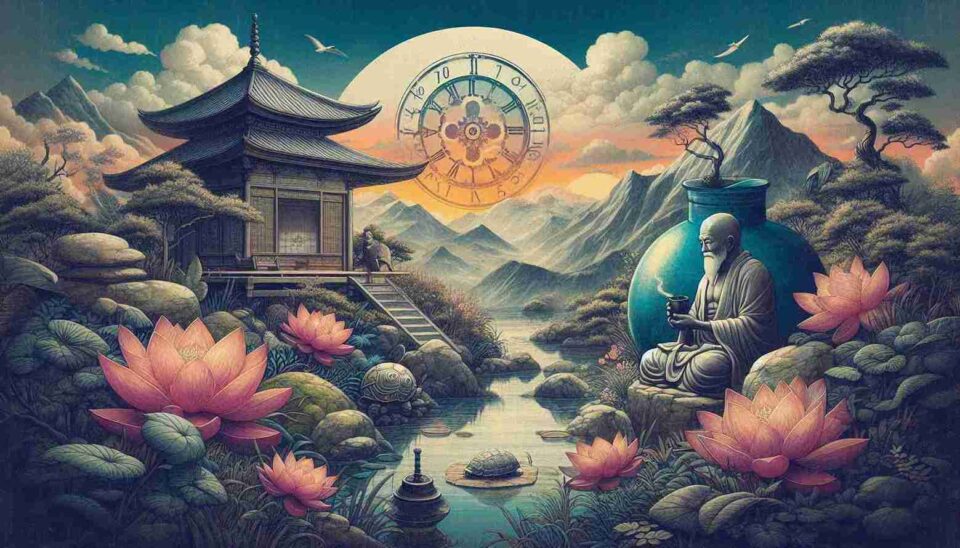Zen Is Just Zen: A Unique Path Beyond Philosophy and Religion
Zen is more than a philosophy or a religion. It is both the most ordinary and the most extraordinary phenomenon that has ever influenced human consciousness. The essence of Zen lies in its simplicity. It is rooted in the here and now, in the acceptance of the mundane as sacred. This acceptance is what makes Zen unique — it requires no otherworldly realms, no metaphysical theories, no divine intervention. Zen is simply about living life as it is, with total immediacy and spontaneity.
Zen: The Most Ordinary, Yet Extraordinary Phenomenon
Zen teaches us to embrace the ordinary aspects of life. It is through this radical acceptance of the present moment that the mundane transforms into the extraordinary. Unlike other spiritual practices that emphasize higher realms or esoteric knowledge, Zen strips away the complexity. It focuses instead on the present — the one reality that we can directly experience. It’s this complete acceptance of life that gives Zen its extraordinary power.
The Non-Dual Nature of Zen
At its core, Zen rejects duality. It doesn’t make distinctions between good and bad, sacred and profane, or material and spiritual. Everything simply is. This non-dual nature makes Zen unique among spiritual paths, as it encourages practitioners to see the interconnectedness of all things. By transcending the mind’s need to categorize, Zen offers a direct experience of reality, free from the filters of judgment or preference.
Zen’s Disdain for Knowledge and the Mind
In Zen, the mind is seen as both a tool and an obstacle. While the intellect is necessary for survival and practical tasks, it becomes an impediment when we rely on it too heavily. Zen does not value intellectual knowledge or elaborate philosophies. It dismisses the mind’s constant chatter, encouraging us to see beyond it and engage directly with life. This approach is profoundly liberating because it allows us to experience life with fresh eyes — without preconceived notions or mental baggage.
Zen’s Rejection of Esoteric and Metaphysical Teachings
Unlike other spiritual traditions that delve into esoteric or mystical realms, Zen remains firmly rooted in the present. It has no interest in metaphysical theories or otherworldly speculations. Zen practitioners do not seek enlightenment in another realm or another life; they seek it here and now. Zen rejects the idea that enlightenment is something to be achieved later or elsewhere. Instead, it insists that enlightenment is available in this very moment.
This Shore Is the Only Shore
Zen teaches that there is no need to look for a “better” or “higher” state of existence. This life, with all its imperfections, is more than enough. There is no need to long for an afterlife, a heaven, or a spiritual utopia. By fully accepting the present moment, Zen allows us to experience a profound sense of peace. This very shore — the reality we are living in — becomes the other shore. The ordinary becomes extraordinary when seen through the lens of Zen.
The Miracle of Zen: Transforming the Mundane into the Sacred
One of the most profound aspects of Zen is its ability to turn the mundane into the sacred. Washing dishes, walking, or drinking tea — all of these ordinary activities can become profound spiritual practices when performed with mindfulness. Zen transforms the mundane by encouraging us to live fully in each moment, without distractions or desires. Through this transformation, life itself becomes sacred, and every action becomes an expression of the divine.
Zen and the Essence of Buddha and Lao Tzu
Zen is the culmination of two great spiritual traditions: the teachings of Buddha and Lao Tzu. While Buddha’s teachings emphasize transcendence and detachment from the world, Lao Tzu’s philosophy is deeply grounded in the earth and nature. Zen merges these two approaches into one seamless path. It acknowledges the transcendent aspects of life but remains firmly rooted in the here and now. In this way, Zen becomes something entirely new — neither Buddhist nor Taoist, but a unique synthesis of both.
Zen: Neither Buddhist nor Taoist
While Zen has its roots in Buddhism and Taoism, it is not bound by either tradition. Zen transcends both, creating something new and unique. It takes the essence of Buddha’s teaching and the essence of Lao Tzu’s teaching and blends them into a single path. This blending of Eastern wisdom creates a philosophy that is neither exclusively Buddhist nor exclusively Taoist but incorporates the best of both.
Zen’s Earthly and Unearthly Qualities
Zen has a unique ability to bridge the gap between the earthly and the unearthly. While it remains deeply rooted in the physical world, Zen also acknowledges the transcendent aspects of existence. It does not reject the material world in favor of some higher spiritual realm. Instead, it integrates the two, allowing practitioners to experience both the earthly and the divine in a single moment.
FAQs
What is the essence of Zen?
The essence of Zen lies in living fully in the present moment, accepting life as it is, without the need for intellectual knowledge or metaphysical speculation.
Is Zen a religion or a philosophy?
Zen is neither a religion nor a philosophy. It transcends both by focusing on direct experience and mindfulness, rather than dogma or intellectual concepts.
How does Zen transform the mundane into the sacred?
Zen transforms the mundane into the sacred by encouraging us to live fully in each moment with mindfulness and acceptance, turning ordinary actions into profound spiritual experiences.
Can Zen be practiced by anyone?
Yes, Zen can be practiced by anyone, regardless of their religious or philosophical background. It is a universal approach to life that emphasizes mindfulness and acceptance.
What is the significance of the present moment in Zen?
In Zen, the present moment is seen as the only reality. The past is gone, and the future has not yet arrived. By living fully in the present, we can experience true peace.

